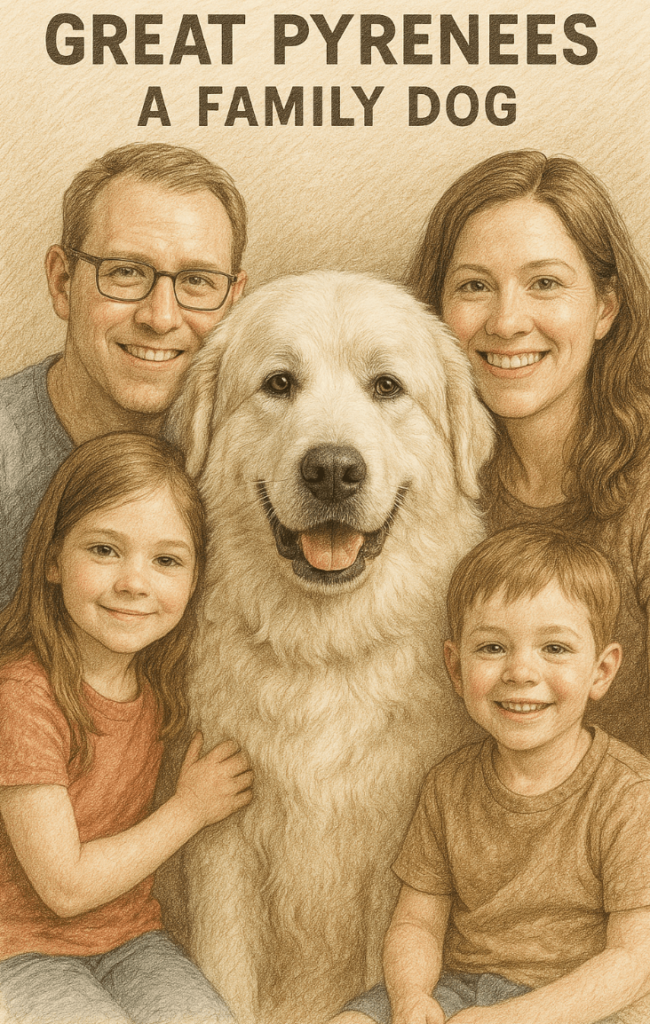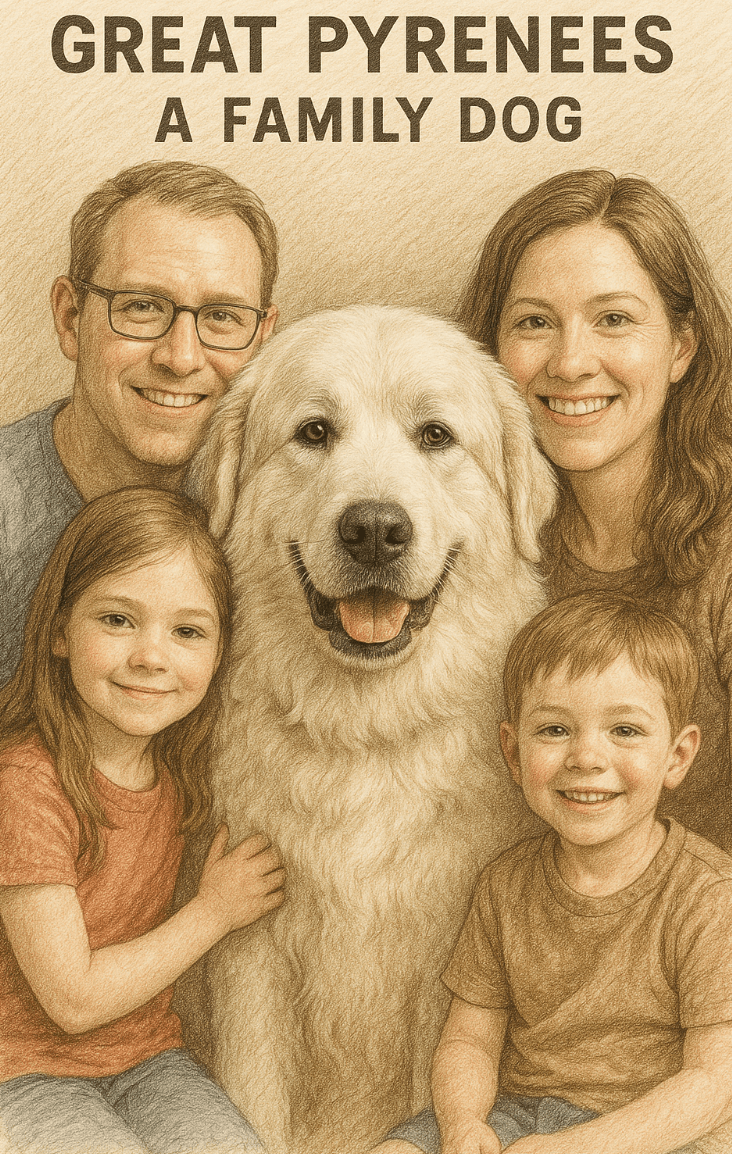Is a Great Pyrenees a Family Dog?
The Great Pyrenees, with its majestic appearance and calm demeanor, often captures the hearts of dog lovers. Known for their role as livestock guardians, these gentle giants are also gaining popularity as family pets. But is a Great Pyrenees truly suited to life as a family dog? While their loyal and protective nature makes them excellent companions, they come with unique needs and characteristics that require careful consideration.
In this blog post, we’ll explore whether the Great Pyrenees is the right fit for your household, covering their temperament, care requirements, and how they interact with families. Whether you’re a seasoned dog owner or considering your first pet, this guide will help you make an informed decision about welcoming a Great Pyrenees into your home.
Key Traits of the Great Pyrenees as a Family Dog
Before deciding if a Great Pyrenees is the right family dog for you, it’s important to understand their core traits. These characteristics shape how they interact with children, other pets, and daily family life.
Gentle and Patient Nature:
Great Pyrenees are known for their calm and patient demeanor, making them excellent companions for children who know how to interact respectfully.Protective Instincts:
Bred as guardians, they have a natural instinct to protect their family, providing a sense of security in the home.Independent Thinkers:
While loyal, they can be stubborn and independent, requiring consistent training and clear boundaries.Affectionate but Reserved:
They form strong bonds with their family but may remain aloof or cautious around strangers.Low Energy Indoors:
Despite their large size, they tend to be calm indoors, preferring to lounge rather than engage in constant activity.
These traits make the Great Pyrenees a loving and protective addition to many families, but their independence and size require thoughtful management.
Challenges of Owning a Great Pyrenees as a Family Dog
While the Great Pyrenees has many admirable qualities, there are challenges to consider before bringing one into your home. Understanding these potential hurdles ensures you’re prepared for the responsibilities of ownership.
Large Size and Space Requirements:
Weighing up to 100 pounds or more, they need ample space to move comfortably, which may not suit small apartments.Heavy Shedding:
Their thick double coat sheds heavily year-round, requiring regular grooming to keep your home fur-free.Strong-Willed Personality:
Training can be challenging due to their independent streak; patience and consistency are essential.Barking Tendencies:
As guard dogs, they are prone to barking at perceived threats, which may disturb neighbors or create noise issues.Exercise Needs:
While not overly energetic, they still require daily walks and outdoor time to stay healthy and happy.
By addressing these challenges proactively, you can ensure a harmonious relationship with your Great Pyrenees.
Check this guide 👉Great Pyrenees Border Collie Mix: Best 7 Expert Tips!
Check this guide 👉Great Pyrenees Husky Mix: Best 7 Expert Tips!
Check this guide 👉Great Pyrenees vs Golden Retriever: Best 7 Expert Tips!

Pros of a Great Pyrenees as a Family Dog | Cons of a Great Pyrenees as a Family Dog |
|---|---|
Gentle and patient with children | Requires significant grooming due to shedding |
Naturally protective of family members | Strong-willed and can be difficult to train |
Calm and low-energy indoors | Prone to excessive barking |
Forms deep bonds with family | Large size may not suit small homes |
Good with other pets if socialized early | Needs secure fencing to prevent wandering |
Tips for Training Your Great Pyrenees
Training a Great Pyrenees requires a unique approach due to their independent nature and strong instincts. With patience and consistency, you can foster good behavior and strengthen your bond.
Start Early:
Begin obedience training and socialization as a puppy to establish good habits and reduce stubborn tendencies.Use Positive Reinforcement:
Reward-based methods, such as treats and praise, work best to motivate this sensitive breed.Be Consistent:
Set clear rules and stick to them; inconsistency can confuse and frustrate your Great Pyrenees.Focus on Socialization:
Expose them to different people, animals, and environments early to build confidence and reduce fear-based reactions.Keep Sessions Short and Fun:
Their attention span is limited, so aim for brief, engaging training sessions to maintain their interest.
With dedication and understanding, training becomes a rewarding experience that enhances your relationship with your Great Pyrenees.
How to Prepare Your Home for a Great Pyrenees
Welcoming a Great Pyrenees into your home requires some preparation to ensure their comfort and safety. Here’s how to create an environment that suits their needs.
Secure Fencing:
Install tall, sturdy fencing to prevent escape attempts, as they are known to wander if left unsupervised.Designate a Comfortable Space:
Provide a cozy corner with a soft bed where they can retreat and relax indoors.Invest in Grooming Tools:
Stock up on brushes and deshedding tools to manage their heavy shedding and maintain their coat’s health.Remove Fragile Items:
Their large size can lead to accidental damage, so keep breakables out of reach.Create a Feeding Routine:
Establish a consistent feeding schedule with high-quality food to support their growth and energy levels.
Preparing your home thoughtfully ensures a smooth transition for both you and your new furry family member.
Common Misconceptions About Great Pyrenees
Despite their growing popularity, several misconceptions surround the Great Pyrenees. Clarifying these myths helps set realistic expectations for potential owners.
They Are Aggressive Guard Dogs:
While protective, they are generally calm and non-aggressive unless provoked or sensing danger.They Don’t Need Much Exercise:
Though not hyperactive, they still require daily walks and outdoor time to stay healthy and balanced.All Great Pyrenees Are Lazy Indoors:
While typically calm indoors, young or under-exercised dogs may exhibit bursts of energy.They Are Easy to Train Like Other Breeds:
Their independent nature means training takes more time and effort compared to highly trainable breeds.They Thrive in Any Living Situation:
Their size and needs make them better suited to homes with yards rather than small apartments.
Understanding the truth behind these myths ensures you’re fully prepared for life with a Great Pyrenees.
Health Considerations for Great Pyrenees
Like all breeds, Great Pyrenees are prone to certain health issues. Being aware of these risks allows you to take preventive measures and provide the best care possible.
Hip Dysplasia:
A common condition in large breeds; maintaining a healthy weight and avoiding strenuous activity during puppyhood can reduce risk.Bloat (Gastric Torsion):
This life-threatening condition can occur in deep-chested dogs; feeding smaller meals and avoiding vigorous exercise after eating helps prevent it.Patellar Luxation:
Occurs when the kneecap slips out of place; regular vet check-ups can detect early signs.Ear Infections:
Their floppy ears trap moisture, increasing infection risk; regular cleaning keeps ears healthy.Bone Cancer:
Larger breeds are more susceptible; monitor for limping or swelling and consult a vet promptly.
Proactive healthcare ensures a longer, healthier life for your beloved Great Pyrenees.
Fun Activities to Enjoy with Your Great Pyrenees
Living with a Great Pyrenees means embracing their calm yet playful nature. These activities will strengthen your bond while keeping them engaged and happy.
Leisurely Walks in Nature:
Explore parks or trails together, allowing them to sniff and enjoy the outdoors at their own pace.Snow Play:
Many Great Pyrenees love snow; playing fetch or simply letting them romp in winter weather is a joy.Obedience Games:
Practice commands like “stay” or “come” in fun, low-pressure settings to reinforce training.Guardian Role Play:
Allow them to “patrol” your yard under supervision, satisfying their instinct to protect.Cuddle Time:
Their affectionate nature makes lounging together on the couch a perfect bonding activity.
Engaging in these activities ensures a fulfilling and joyful life for your gentle giant.
Frequently Asked Questions About Great Pyrenees as Family Dogs
Are Great Pyrenees good with kids?
Yes, they are gentle and patient with children, but supervision is recommended to prevent accidental knocks due to their size.
Do they get along with other pets?
With proper socialization, they can coexist peacefully with other animals, including cats and smaller dogs.
How much exercise do they need?
Moderate exercise, such as daily walks and playtime, is sufficient to keep them physically and mentally stimulated.
Can they live in warm climates?
Their thick coat helps regulate body temperature, but they should have access to shade and water in hot weather.
Are they easy to train?
While intelligent, their independent nature can make training challenging; patience and consistency are key.
Embracing Life with a Great Pyrenees as a Family Dog
The Great Pyrenees is a remarkable breed that combines loyalty, gentleness, and a protective instinct, making them a wonderful addition to many families. However, their large size, grooming needs, and independent personality require commitment and preparation. By understanding their unique traits and meeting their needs, you can enjoy a fulfilling and loving relationship with this majestic dog. If you’re ready for the responsibility, a Great Pyrenees can bring joy, security, and companionship to your household for years to come.
Do Cats Have Taste Buds? Best 7 Expert Tips! – Discover how cats experience flavors and why their taste is so unique.
Do Dogs Have Taste Buds? Best 7 Expert Tips! – Discover how dogs experience taste, their preferences, and what it means for their diet and health.
Can Cats Taste Sweet? Best 7 Expert Tips! – Discover why cats can’t taste sweetness, how it affects their diet, and tips to keep them healthy and happy.
Can Dogs Taste Sweet? Best 7 Expert Tips! – Discover how dogs perceive sweetness, which foods are safe, and tips to manage their sweet cravings responsibly.





